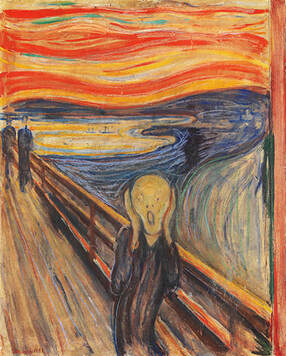 In the news we just learnt that the famous painter Edward Munch wrote “painted by a madman” on his most famous painting “The Scream.” As in all his endeavors, that inscription and painting neatly combined insight and instability. His insight preceded research on the management of creative work by 125 years. Management scholars just caught up. Research by Guiseppe Soda, Pier Vittorio Mannucci, and Ronald S. Burt published in Academy of Management Journal investigated what distinguishes teams that can produce highly creative products. Their work is quite a feat because it focused on one of the greatest strings of creative successes in modern television: the science fiction series Doctor Who produced by BBC. This is a series that has been widely praised as being high quality and creatively conceived throughout, but differences among episodes in the creativity were still large enough for the researchers to find the sources of creativity. Ready for the answer? It is instability, as Munch noted and practiced. But the lesson is a little more complicated than that. It is well known that certain kinds of network connections generate creativity, specifically open networks in which each person gets diverse information by being connected to people who are not connected to each other. This is well known and makes sense but is not as reliable a predictor of creativity as one would expect. It also follows that getting a stream of diverse information creates creativity (indeed, some of my research shows that), but again it is a less reliable predictor than one would expect. Why do these two factors work sometimes but now always? The answer is instability. An open network does not generate much creativity if it is stable, because there simply is not enough new people to spur creativity. Similarly, new content helps creativity little when the network is stable because it keeps being interpreted by the same people. Add some instability to the network, and suddenly openness and information diversity start operating as expected, increasing creativity. In the case of Doctor Who, the effects were big enough that many modern fans do not even realize that the TV series has been canceled because of lack of audience interest, before being restarted and again experiencing significant success. Creativity won the day. Of course, this research was not done for the purpose of giving us more good TV. Firms depend on creativity in many areas of activity, most conventionally in research and development, but also for product updates, new business model generation, and re-launch of product and service lineups that have gone obsolete in in the minds of consumers. This research tells managers that fans can and should shake up the teams that make such changes whenever significant creativity is needed. When managers follow Munch’s lead and generate instability, team members who are moved around may scream, but the increase in creativity is worth it. Soda, Guiseppe,Pier Vittorio Mannucci, and Ronald S. Burt. 2021. Networks, Creativity, and Time: Staying Creative through Brokerage and Network Rejuvenation. Academy of Management Journal, forthcoming. Comments are closed.
|
Blog's objectiveThis blog is devoted to discussions of how events in the news illustrate organizational research and can be explained by organizational theory. It is only updated when I have time to spare. Archives
May 2024
Categories |
 RSS Feed
RSS Feed